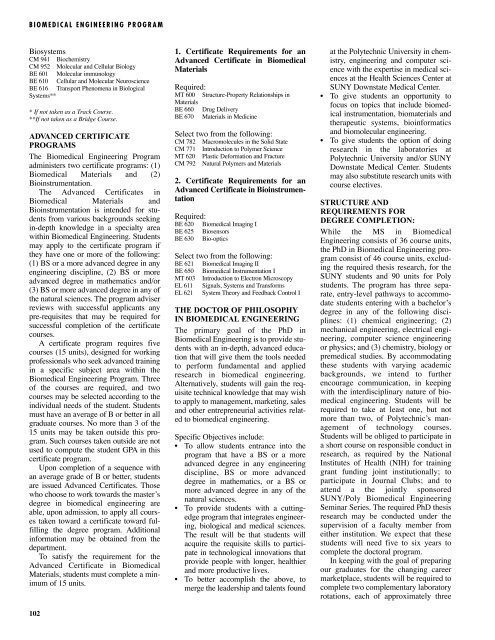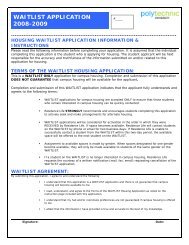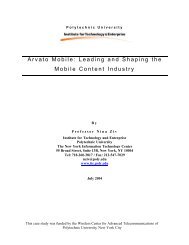POLYTECHNIC UNIVERSITY 2005-2007
POLYTECHNIC UNIVERSITY 2005-2007
POLYTECHNIC UNIVERSITY 2005-2007
You also want an ePaper? Increase the reach of your titles
YUMPU automatically turns print PDFs into web optimized ePapers that Google loves.
BIOMEDICAL ENGINEERING PROGRAM<br />
Biosystems<br />
CM 941 Biochemistry<br />
CM 952 Molecular and Cellular Biology<br />
BE 601 Molecular immunology<br />
BE 610 Cellular and Molecular Neuroscience<br />
BE 616 Transport Phenomena in Biological<br />
Systems**<br />
* If not taken as a Track Course.<br />
**If not taken as a Bridge Course.<br />
ADVANCED CERTIFICATE<br />
PROGRAMS<br />
The Biomedical Engineering Program<br />
administers two certificate programs: (1)<br />
Biomedical Materials and (2)<br />
Bioinstrumentation.<br />
The Advanced Certificates in<br />
Biomedical Materials and<br />
Bioinstrumentation is intended for students<br />
from various backgrounds seeking<br />
in-depth knowledge in a specialty area<br />
within Biomedical Engineering. Students<br />
may apply to the certificate program if<br />
they have one or more of the following:<br />
(1) BS or a more advanced degree in any<br />
engineering discipline, (2) BS or more<br />
advanced degree in mathematics and/or<br />
(3) BS or more advanced degree in any of<br />
the natural sciences. The program adviser<br />
reviews with successful applicants any<br />
pre-requisites that may be required for<br />
successful completion of the certificate<br />
courses.<br />
A certificate program requires five<br />
courses (15 units), designed for working<br />
professionals who seek advanced training<br />
in a specific subject area within the<br />
Biomedical Engineering Program. Three<br />
of the courses are required, and two<br />
courses may be selected according to the<br />
individual needs of the student. Students<br />
must have an average of B or better in all<br />
graduate courses. No more than 3 of the<br />
15 units may be taken outside this program.<br />
Such courses taken outside are not<br />
used to compute the student GPA in this<br />
certificate program.<br />
Upon completion of a sequence with<br />
an average grade of B or better, students<br />
are issued Advanced Certificates. Those<br />
who choose to work towards the master’s<br />
degree in biomedical engineering are<br />
able, upon admission, to apply all courses<br />
taken toward a certificate toward fulfilling<br />
the degree program. Additional<br />
information may be obtained from the<br />
department.<br />
To satisfy the requirement for the<br />
Advanced Certificate in Biomedical<br />
Materials, students must complete a minimum<br />
of 15 units.<br />
102<br />
1. Certificate Requirements for an<br />
Advanced Certificate in Biomedical<br />
Materials<br />
Required:<br />
MT 600 Structure-Property Relationships in<br />
Materials<br />
BE 660 Drug Delivery<br />
BE 670 Materials in Medicine<br />
Select two from the following:<br />
CM 782 Macromolecules in the Solid State<br />
CM 771 Introduction to Polymer Science<br />
MT 620 Plastic Deformation and Fracture<br />
CM 792 Natural Polymers and Materials<br />
2. Certificate Requirements for an<br />
Advanced Certificate in Bioinstrumentation<br />
Required:<br />
BE 620 Biomedical Imaging I<br />
BE 625 Biosensors<br />
BE 630 Bio-optics<br />
Select two from the following:<br />
BE 621 Biomedical Imaging II<br />
BE 650 Biomedical Instrumentation I<br />
MT 603 Introduction to Electron Microscopy<br />
EL 611 Signals, Systems and Transforms<br />
EL 621 System Theory and Feedback Control I<br />
THE DOCTOR OF PHILOSOPHY<br />
IN BIOMEDICAL ENGINEERING<br />
The primary goal of the PhD in<br />
Biomedical Engineering is to provide students<br />
with an in-depth, advanced education<br />
that will give them the tools needed<br />
to perform fundamental and applied<br />
research in biomedical engineering.<br />
Alternatively, students will gain the requisite<br />
technical knowledge that may wish<br />
to apply to management, marketing, sales<br />
and other entrepreneurial activities related<br />
to biomedical engineering.<br />
Specific Objectives include:<br />
• To allow students entrance into the<br />
program that have a BS or a more<br />
advanced degree in any engineering<br />
discipline, BS or more advanced<br />
degree in mathematics, or a BS or<br />
more advanced degree in any of the<br />
natural sciences.<br />
• To provide students with a cuttingedge<br />
program that integrates engineering,<br />
biological and medical sciences.<br />
The result will be that students will<br />
acquire the requisite skills to participate<br />
in technological innovations that<br />
provide people with longer, healthier<br />
and more productive lives.<br />
• To better accomplish the above, to<br />
merge the leadership and talents found<br />
at the Polytechnic University in chemistry,<br />
engineering and computer science<br />
with the expertise in medical sciences<br />
at the Health Sciences Center at<br />
SUNY Downstate Medical Center.<br />
• To give students an opportunity to<br />
focus on topics that include biomedical<br />
instrumentation, biomaterials and<br />
therapeutic systems, bioinformatics<br />
and biomolecular engineering.<br />
• To give students the option of doing<br />
research in the laboratories at<br />
Polytechnic University and/or SUNY<br />
Downstate Medical Center. Students<br />
may also substitute research units with<br />
course electives.<br />
STRUCTURE AND<br />
REQUIREMENTS FOR<br />
DEGREE COMPLETION:<br />
While the MS in Biomedical<br />
Engineering consists of 36 course units,<br />
the PhD in Biomedical Engineering program<br />
consist of 46 course units, excluding<br />
the required thesis research, for the<br />
SUNY students and 90 units for Poly<br />
students. The program has three separate,<br />
entry-level pathways to accommodate<br />
students entering with a bachelor’s<br />
degree in any of the following disciplines:<br />
(1) chemical engineering; (2)<br />
mechanical engineering, electrical engineering,<br />
computer science engineering<br />
or physics; and (3) chemistry, biology or<br />
premedical studies. By accommodating<br />
these students with varying academic<br />
backgrounds, we intend to further<br />
encourage communication, in keeping<br />
with the interdisciplinary nature of biomedical<br />
engineering. Students will be<br />
required to take at least one, but not<br />
more than two, of Polytechnic’s management<br />
of technology courses.<br />
Students will be obliged to participate in<br />
a short course on responsible conduct in<br />
research, as required by the National<br />
Institutes of Health (NIH) for training<br />
grant funding joint institutionally; to<br />
participate in Journal Clubs; and to<br />
attend a the jointly sponsored<br />
SUNY/Poly Biomedical Engineering<br />
Seminar Series. The required PhD thesis<br />
research may be conducted under the<br />
supervision of a faculty member from<br />
either institution. We expect that these<br />
students will need five to six years to<br />
complete the doctoral program.<br />
In keeping with the goal of preparing<br />
our graduates for the changing career<br />
marketplace, students will be required to<br />
complete two complementary laboratory<br />
rotations, each of approximately three




